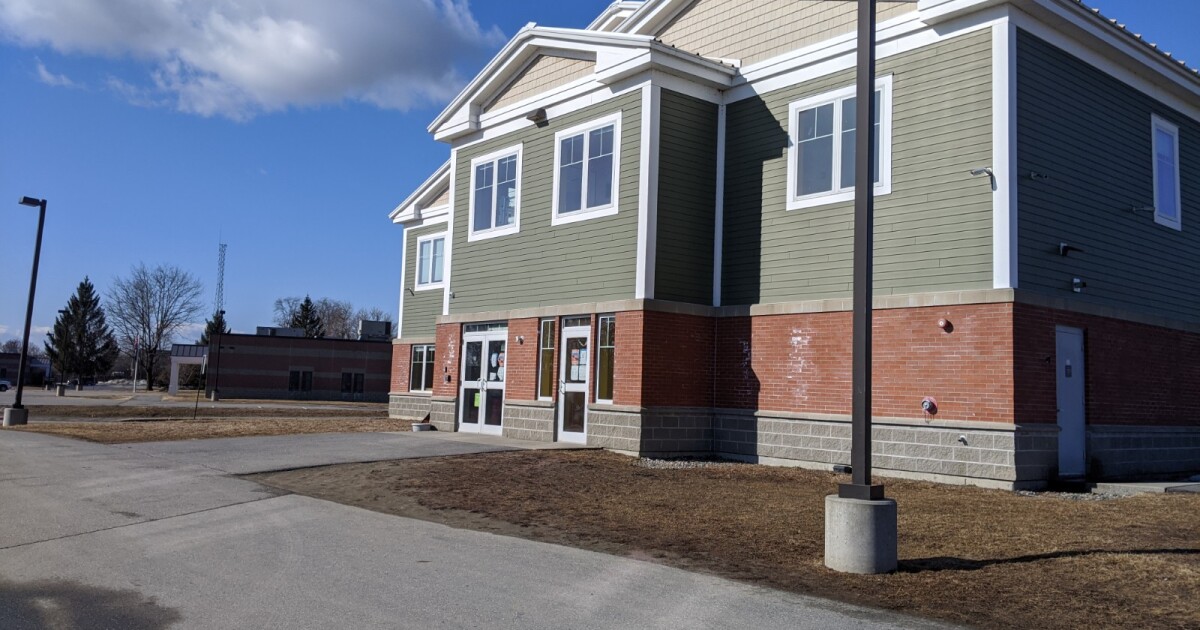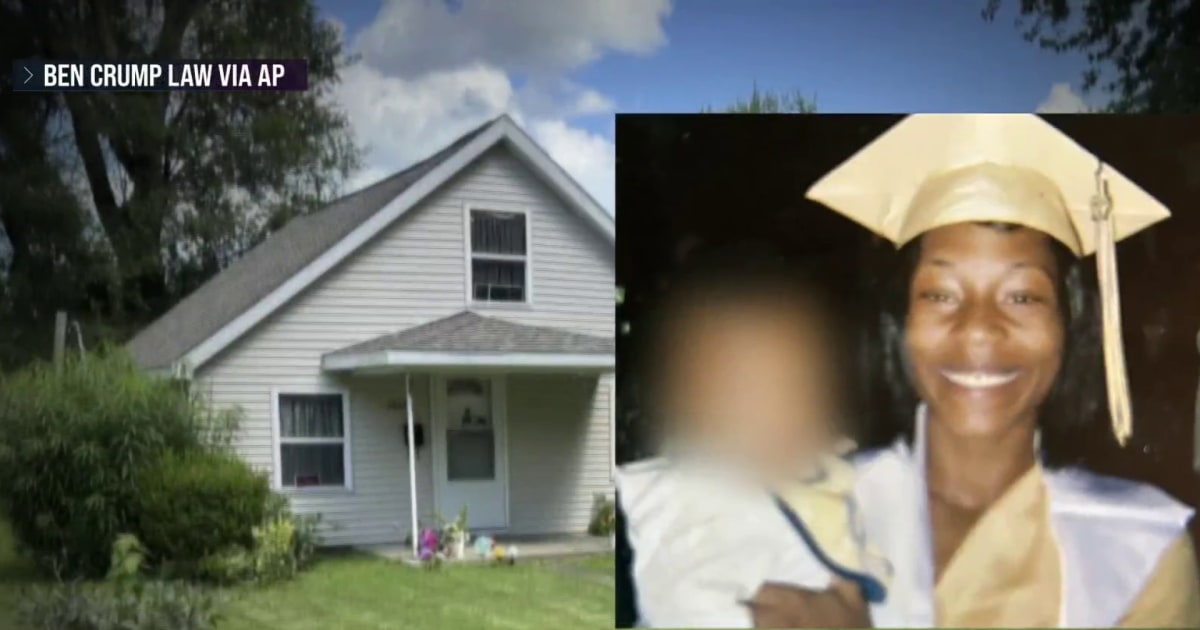Maine
How Maine groups are working with landlords to quickly get residents housed

One promising approach to addressing homelessness in Maine, advocates say, is “rapid rehousing,” which uses several strategies, including housing navigators and financial incentives to landlords, to get people into apartments quickly.
As part of our occasional series exploring solutions to homelessness, Maine Public’s Robbie Feinberg spoke with Mid-Maine Homeless Shelter CEO Katie Spencer-White about how her team has managed to get about 30 households into new housing since last March using the approach.
White said it can be nearly impossible for a resident of Waterville to find an apartment on their own.
This interview has been edited for clarity.
Spencer-White: Today post-pandemic, our vacancy rate here locally in Waterville, where we operate, we’ve gone from probably 5% or 6%, pre-pandemic, which is a healthy vacancy rate, to sub-5%. We’re probably in the region of 2%, at this point. Which means we need to actively engage with landlords. They need to want to partner with us in order for us to find the units. We’re not going to just find them by going onto Craigslist, or seeing what listing has come out on a Facebook page, right? We really have to partner intensively with landlords and make sure that the new tenants that we’re offering to them make good business sense.
Feinberg: What tools do you have, what can you say to a landlord or what can you offer to a landlord to say, ‘Hey, rent to this person’?
We can make it make good business sense, right? So all of our tenants are going to — each of those units is going to require a Maine State Housing inspection to make sure the unit is in good condition. Sometimes that takes a little while, up to three weeks. So we find a unit, we don’t want the landlord to go without receiving any kind of payment for that unit. Oftentimes, they need that revenue coming in for themselves, because they’re running businesses. So we can put some money down to hold that unit. We can also help with minor repairs. So if it’s just a matter of a little bit of remediation, we need to put in a handrail or something like that to get it passed inspection, we can also support those efforts. So that landlords aren’t having to pay out of pocket to rent to somebody who’s going to have to go through a MaineHousing inspection, for example.
But there’s also the concerns around the relationship. And I think that’s probably one of the biggest fears, and the most important work that we do, is helping navigate that landlord-tenant relationship. We’re in it for the long haul. We might be funded to work with a tenant for six months. But if two years into that tenancy, the landlord calls up and says, ‘Hey, you know, there’s a little bit of miscommunication going on, I’m not able to talk to the tenant, I don’t know what’s going on, but I don’t want to have to evict them,’ they can call us and we can step in and see if we can smooth out that relationship, find out what’s going wrong and help get it on an even keel again.
Are there examples you can think of, of how that that has worked? Where you all have been able to step in? And maybe that has kept someone housed?
I mean, we have tons of examples. Something as basic as, I remember one household was a mom, and she had two teenage sons. And the two teenage sons were going out and playing basketball late at night. And that was causing a nuisance, right? But once we were able to step in and say, ‘Hey, we’re going to need to correct this particular behavior, put some boundaries around it — it’s totally fine to play basketball, we want kids outside being healthy, but it needs to be within these parameters.’ The mom didn’t realize that it was causing an issue, once we got it figured out.
And that tenancy was moving towards an eviction, right, because it was just becoming an ongoing issue. But once we were able to communicate it and say, ‘Let’s put some boundaries on that, keep it healthy for everybody,’ it smooths everything over. And that relationship that was almost fundamentally broken, was rehabilitated, and that tenant is still housed, in an apartment, and within a community that they really like.
So when you think about what you would want to do moving forward, how much of that involves expanding a program like this, versus other solutions?
If I was queen for a day, and could direct the Legislature to fund anything, it would be to fund vouchers. We know that affordability and lack of income is really the the key barrier to a lot of folks staying in housing. Seventy percent of evictions are for nonpayment of rent. And if we can fix that program, we’ve solved that problem. We’ve solved 70% of the issues.
But I don’t think we’re going to fund vouchers universally. Certainly not the state level, not the federal level, not yet. So that being said, this is the world that we live in. We need to have these kinds of programs, so that when people find themselves in a crisis because somebody’s moved out of the household, they’ve lost income because of an illness, because they’re going on to a fixed income, we need to have programs in place that can meet them where they are and quickly get them where they need to be which is in permanent, affordable housing.

Maine
Maine state police bomb team at a home in Penobscot County

MILFORD, Maine – The Maine’s State Police Bomb Team is at a residence on Call Road in Milford processing a scene for potential hazardous devices.
Officials say there is no danger to the public.
This is a developing story.
Copyright 2024 WABI. All rights reserved.
Maine
Charleston man found dead in Maine plane crash

TRENTON, MAINE — A Charleston pilot was found dead on July 25 in the wreckage of a plane crash at a small coastal airport in Maine.
Maine State Police responded to reports of a plane crash at Hancock County-Bar Harbor Airport in Trenton around 12:25 p.m., according to a news release. The aircraft, a single-engine Cirrus SR22, crashed on approach to the airport, according to a statement from the Federal Aviation Administration.
The FAA said the plane had taken off from Morristown Municipal Airport in New Jersey.
The victims were later identified as 71-year-old Michael Leibowitz of Charleston and 57-year-old Christina Chung of Livingston, N.J. Police said that Leibowitz was piloting the plane before it crashed.
The FAA and the National Transportation Safety Board are leading the investigation into the crash, and the NTSB will provide any updates.
Leibowitz was the founder of Call Experts, a family-owned and operated call center based in West Ashley that provides telecommunications and other office services to companies and professionals.
Maine
In Maine, murdering trees for a killer view is apparently not a crime – The Boston Globe

It galled him and other town officials so much, in fact, that they decided the $1.7 million assessed against the Bonds in a legal settlement and fines and other penalties wasn’t punishment enough. They have now asked Knox District Attorney Natasha Irving and Maine Attorney General Aaron Frey to pursue criminal charges.
It remains unclear if the attorney general will intervene, but this week Irving notified Hedstrom she would not seek charges and told the Globe she didn’t believe she could prove a violation of any Maine criminal statutes. So far, Frey’s office is not talking. But the drive for criminal penalties is yet another sign of the acrimony unleashed by a case that generated international headlines and has left lingering resentment about wealthy landowners who might feel they can buy their way out of trouble.
“I am afraid it will not be the last if those of us with the responsibility of protecting the public and the environment do not enforce all applicable laws to the greatest extent possible,” Camden’s town manager, Audra Caler, wrote in her request to Frey’s office.
Indeed, emotions run so hot that the town’s planning director and enforcement officer, Jeremy Martin, says he is routinely fielding angry calls from strangers near and far.
“I check my voice mail and there’s somebody from Florida saying, ‘You gotta nail those people.’ A nice elderly lady from Kennebunkport said, ‘Oh, I can’t believe it. Go after them!’ I get why people here care so much,” Martin said. “But I don’t understand why I’m getting calls from all over.”
Most agree the notoriety of the case is driven at least in part by the wealth of those involved; Gorman is the widow of L.L. Bean chairman Leon Gorman, who when he died in 2015 was described as Maine’s wealthiest resident. The Bonds are a wealthy, politically connected couple from Missouri. Amelia Bond was CEO of a St. Louis foundation that manages money for various charities. Arthur Bond is a prominent architect, and nephew of Christopher “Kit” Bond, who served as Missouri’s governor and a US senator.
Like other wealthy summer residents who have been building or buying big houses here for more than a century, the Gormans were attracted to Camden’s serene beauty and proximity to both the sea and mountains. They bought their waterfront home in 2002. The Bonds paid $1.8 million for theirs in 2018. It has four bedrooms, five bathrooms, and more than 4,000 square feet of living space, located right next to the town’s small beach and park. If there was a drawback, it was that their views of the picturesque harbor were obstructed by Gorman’s house, which is directly in front of and below theirs on a sloping hill, and especially by tall oak trees on Gorman’s property.
Gorman noticed her trees looked sick in the spring of 2022, according to documents and correspondence filed with the town, as well as interviews with town officials. Around that time, Gorman’s landscapers caught tree cutters hired by the Bonds cutting the tops off trees on Gorman’s property and told them to stop.
Then, Amelia Bond approached Gorman in June 2022 and said Gorman’s oak trees looked sick and offered to split the cost of cutting them down, an offer Gorman did not accept.
Instead, Gorman asked her arborist to find out what was wrong with them. The arborist took samples of the trees, which came back positive for Tebuthiuron, a powerful herbicide commonly used on cattle ranches in the Midwest but not in Maine.
The town got involved and the state did its own testing, confirming that Tebuthiuron was present in the trees, the soil, and more worrying, that it had potentially leached down onto the beach, the park, and the harbor.
Exit the arborists, enter the lawyers.
Attorneys representing Gorman and the Bonds, and eventually the town and state, began a series of painstaking negotiations in which the Bonds accepted responsibility for poisoning Gorman’s trees and town land.
A lawyer for the Bonds wrote to the town, acknowledging that Amelia Bond had brought the herbicide from Missouri and used it on the trees, but said she was trying to treat a browntail moth infestation.
In a letter to the town, Daniel Nuzzi, a lawyer for Gorman, hotly disputed the suggestion that the use of the herbicide was anything less than malicious.
“It is my client’s position that the cutting the tops off numerous trees and applying a strong herbicide on her property was admitted to have been done by the Bonds to improve their view of Camden Harbor,” Nuzzi wrote. “There should be no misperception concerning a browntail moth problem with Mrs. Gorman’s property, as none existed.”
Nuzzi said neither he nor his client would comment on whether Gorman supported the town’s push for criminal charges, nor any other aspect of the case.
Through their attorney, Joseph Mendes, the Bonds declined to be interviewed, but Mendes said his clients have been open and cooperative, first with Gorman, and then with the town and state.
“The Bonds sincerely regret these circumstances and the unintended consequences that were created,” Mendes said. “They have expressed remorse and have consistently taken steps to address this situation, and they will continue to cooperate with the parties given the seriousness of the allegations.”
There have been no reported sightings of the Bonds in town this year. No one answered the door at their home here.
Some residents claim the Bonds had to quit the Camden Yacht Club. In an interview, the club’s commodore, Colleen Duggan, said the Bonds are not members, but declined to say whether they once were.
“The only thing I can confirm is that they are currently not members,” she said.
As for criminal penalties, Irving, the Knox County DA, said any admissions the Bonds made in civil settlement agreements with Gorman, the town, and state would not be admissible in a criminal case. She said she concluded the only charge she might feasibly pursue was criminal mischief, a misdemeanor that carries a $250 fine, “which pales in comparison to action already taken.”
Danna Hayes, special assistant to Attorney General Frey, declined to comment about the status of its review.
Kevin Cullen is a Globe reporter and columnist who roams New England. He can be reached at kevin.cullen@globe.com.
-

 World1 week ago
World1 week agoOne dead after car crashes into restaurant in Paris
-

 Midwest1 week ago
Midwest1 week agoMichigan rep posts video response to Stephen Colbert's joke about his RNC speech: 'Touché'
-

 News1 week ago
News1 week agoVideo: Young Republicans on Why Their Party Isn’t Reaching Gen Z (And What They Can Do About It)
-

 Movie Reviews1 week ago
Movie Reviews1 week agoMovie Review: A new generation drives into the storm in rousing ‘Twisters’
-

 News1 week ago
News1 week agoIn Milwaukee, Black Voters Struggle to Find a Home With Either Party
-

 Politics1 week ago
Politics1 week agoFox News Politics: The Call is Coming from Inside the House
-

 News1 week ago
News1 week agoVideo: J.D. Vance Accepts Vice-Presidential Nomination
-

 World1 week ago
World1 week agoTrump to take RNC stage for first speech since assassination attempt















